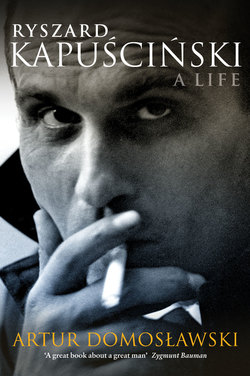Читать книгу Ryszard Kapuscinski - Artur Domoslawski - Страница 12
На сайте Литреса книга снята с продажи.
Оглавление6
Lapidarium 1: The Poet
‘I was a victim of Mayakovsky,’ he said years later in a conversation with a younger colleague, the poet Jarosław Mikołajewski. ‘My attempts at the time, my “Mayakovsky period”, was disappointing for me too. I wanted to shake it off, but I no longer had the time to look for other paths to take. I started working as a journalist and moved over to prose. To reportage.’
Kapuściński never fully confronted his youthful choices, and never mentioned the circumstances of the era in which he went through his ‘Mayakovsky period’. What cause did it serve? Years later, how did he judge that time and his involvement in it as a poet writing propaganda poems?
After his adventure with ‘Mayakovsky-ism’, he parts ways with poetry for almost thirty years. He reads and collects books by Polish and foreign poets but does not return to writing poetry himself. He will not publish his collection of poems entitled Notebook until 1986; his second and last, The Laws of Nature, will come out shortly before his death. He says he does not feel like a ‘professional poet’, that what he values in poets is their attention to language itself (whereas prose writers pay the most attention to the plot, and essayists to actual thought):
Writing poetry allows you to touch the living language, explore its limits, and appreciate the value of the actual word and metaphor stripped of secondary reinforcement.
Some states and moods cannot be expressed in any other way. Only through poetry.1
Kapuściński’s poems arouse greater interest abroad than in Poland. The Italian writer Claudio Magris calls him ‘an original poet of intense and sparing expression’,2 and compares him with the greatest Polish poets of the twentieth century – Czesław Miłosz, Wisława Szymborska and Tadeusz Różewicz.
I ask another eminent Polish poet, Julia Hartwig, who was a friend of Kapuściński’s, about their conversations concerning poetry. I also ask what she thinks of her late friend’s poems. ‘He was a poet manqué,’ she replies. ‘He said that if he could have chosen who he would like to be, he would have chosen to be a poet. He read poetry and was interested in new work, and sought out opportunities to meet poets. He did his best to encourage young, unknown and underrated poets. I don’t think his poetic talent was a patch on his talent as a reporter. And I think he had a complex about it. His poems are certainly genuine, some are truly well “made”, but they don’t have what I would call a “grand scale”, they don’t move anything inside me.’
Didn’t he have a great talent for poetry?
‘Maybe he didn’t, or maybe he did, but was never able to develop it, because he spent his whole life doing something else. Writing reportage means being “in action”, “in motion”. Poetry demands a different kind of focus; it develops different qualities in a writer. As Baudelaire said, poetry requires “doing nothing”. Kapuściński was sometimes a superb poet in prose.’
Andrzej Czcibor-Piotrowski remembers how, with some sorrow and a little envy, Kapuściński once said to him: ‘You are a poet in the Polish Writers Union, but I’m just a journalist.’
